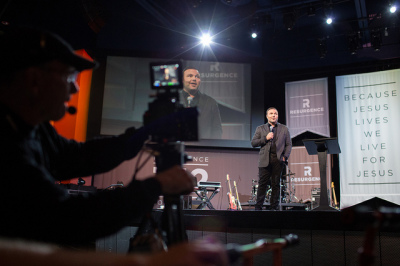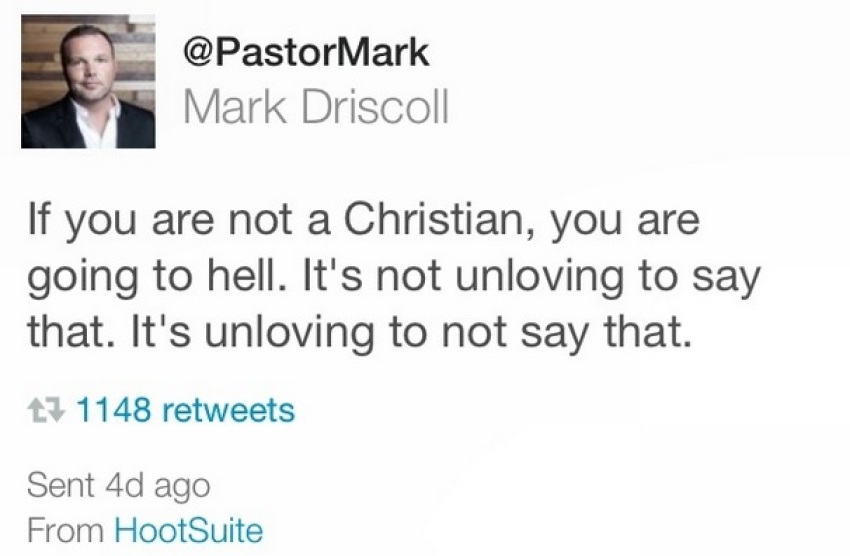Mark Driscoll Fires Up His Detractors, Social Media-Minded Christians With 'Going to Hell' Tweet

Seattle-based megachurch pastor Mark Driscoll once again lit up the Twitter-sphere, especially within the communities of his faithful detractors and social media-minded Christians who took his recent tweet about hell as perfect reason to join the fray.
"If you are not a Christian, you are going to hell. It's not unloving to say that. It's unloving to not say that," Driscoll, the unashamedly controversy-prone pastor, tweeted last Friday.
Among the hundreds if not thousands of responses to his tweet, someone with the Twitter username "@almightygod" tweeted: .@PastorMark Isn't threatening non-Christians with hell sort of like threatening adults with coal in their xmas stocking?
Another tweet, this one from "@MrOzAtheist," typifying some of the responses: .@PastorMark If the god you believe in exists and is as loving as you claim no one would go to hell for simply 'not believing'. #GrowUp
The subject of hell and how Christians should address the subject from the pulpit or while evangelizing is not new, but in recent years came to the forefront when controversial Christian author and former megachurch pastor Rob Bell released the book, Love Wins: A Book About Heaven, Hell, and the Fate of Every Person Who Every Lived, three years ago. The book drew much fire from prominent evangelical leaders, with some accusing Bell of heresy.
Bell's basic argument in the book is that "a loving God would not send billions of people to a horrible hell."
During the time of its release, Driscoll, who is founding pastor of Mars Hill Church, stated in a Resurgence blog post that it is important to understand that God doesn't send just anyone to hell, but only those who reject His revelation and choose to suppress the truth that He plainly reveals to them. Driscoll made his statements without naming Bell, but during the peak of the controversy surrounding Love Wins.

On Tuesday, Driscoll was asked by The Christian Post to give further insight into his polarizing tweet about hell but declined to respond.
However, in his blog post published at the time of the Bell controversy, Driscoll wrote, "Hell is only for those who persistently reject the real God in favor of false gods. To paraphrase C.S. Lewis, either people will say to God, 'Thy will be done,' or God will say to them, 'Thy will be done.'"
In the same blog, Driscoll responded to the argument that a loving God would be more tolerant by posing a counter argument that if God was tolerant of everyone then he should also tolerate rapists, pimps, pedophiles, and those who sin against the very people criticizing God as intolerant.
"The idea is completely absurd and unjust," Driscoll argued. "A loving God protects His children from sin and evil by separating them. In this way, God is a father who is tolerant of all who obey Him and are safe for His children. But He is intolerant of those who sin against Him and do evil to His children."
Author and blogger, Ben Irwin, who describes his spiritual journey as being "in and out of Calvinism" and one in which he was confirmed in the Episcopal Church just three years ago, argued in his blog post in response to Driscoll's tweet, published Tuesday, that there is no discussion of hell in the book of Acts and therefore not primary to Gospel discussion.
Irwin writes, "So here's my question for Pastor Mark Driscoll: If hell is so important to the gospel, why is it never mentioned in the book of Acts?"
He explains that Acts is the record of the first people to follow Jesus and how their message spread across the Roman Empire.
"Among other things, Acts contains 14 or 15 of the earliest Christian sermons. (The number varies, depending on what you count as a sermon.) Eight of these are Kerygmatic sermons, which is a fancy term for proclamatory or evangelistic speeches — i.e. someone telling others about Jesus," states Irwin.
"In these eight sermons, there is not one mention of hell. In fact, hell is completely absent from the whole book," he continued. "Judgment is mentioned once or twice, but the nature of judgment? It's never part of their gospel proclamation."
Irwin asks, "So why does Mark Driscoll think hell is essential to his gospel proclamation? Why does he feel compelled to say something the first evangelists never needed to say? Isn't that 'adding to the gospel?'"
He then concludes that maybe it's not unloving to tell someone they're going to hell. "But it's more than a little presumptuous, both about their standing with God and the nature of judgment. Besides, even if it's not unloving, the first proclaimers of the gospel evidently felt it was unnecessary," Irwin wrote.



























